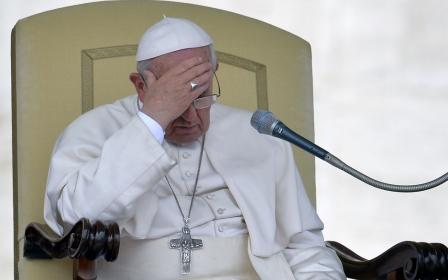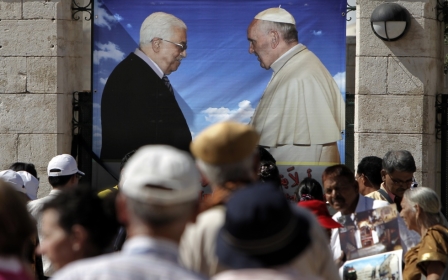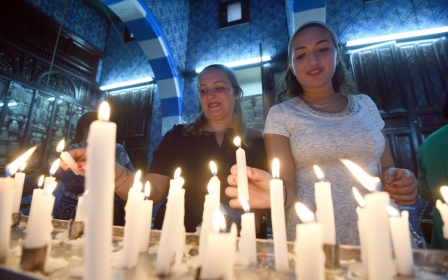Papal Middle East visit sparks opposition

Israel has placed three ulta-orthodox young Jewish activists under house arrest after suspicions arose that they were planning to disrupt Pope Francis's visit to the Holy Land this weekend, Israeli police said on Wednesday.
The police and security service also took out restraining orders against the activists who “according to information from Shin Bet [security services] are planning to commit provocative acts during the pope's visit," police spokeswoman Luba Samri told AFP.
According to Haaretz newspaper, the security services also said that they believed activists were likely to engage in "provocative and illegal activities in order to arouse interreligious tension on the visit's occasion."
"The recommendations were approved by authorised security officials after legal examination by the attorney general," which strikes a balance between "security needs and harm to personal rights," the security services said in a statement.
The statement noted the three activists who received the restraining orders retain the right of appeal.
New MEE newsletter: Jerusalem Dispatch
Sign up to get the latest insights and analysis on Israel-Palestine, alongside Turkey Unpacked and other MEE newsletters
Two of the youths are believed to be aged 17 and according to media reports study together at a yeshiva by David's Tomb in Jerusalem. According to Haaretz, one of the youths is from Netanya, in northern Israel, while the other is from the Israeli West Bank settlement of Kiryat Arba in the West Bank near Hebron. A third youth has been forbidden from leaving the western Jerusalem neighbourhood of Kiryat Moshe.
The restrictions vary, although most of them will expire early next week once the pope concludes his visit.
The pope is expected to commence his visit to the region on Saturday 24 May. While pope’s periodically visit the Holy Land, controversy has surrounded the recent visit which will be this pope’s first.
Last week, three people were arrested near David’s Tomb in Old Jerusalem for allegedly intending to distribute material protesting the pope’s visit. They were later released and placed under house arrest after a judge ruled against their detention, arguing that the distribution of flyers did not constitute a legal infraction.
Pope Francis has tried to play down any tensions on Wednesday stating that his trip would be "purely religious" and mainly aimed at improving relations with other branches of Christianity and praying for peace in the region.
"It will be a purely religious trip," the Argentine pope told some 50,000 pilgrims at a general audience in St Peter's Square ahead of three-day trip to Israel, Jordan and the Palestinian Territories.
Francis said the main reasons for the trip - billed a "pilgrimage of prayer" by the Vatican - were to meet with the Orthodox Patriarch of Constantinople Bartholomew I and "to pray for peace in that land which has suffered so much".
Regional powers, however, have been trying to politicise the visit. Shortly following the pope’s statements Jordan expressed hope that his visit would promote regional stability, including the advancement of the stalled Middle East peace talks.
"The pope's May 24-26 visit carries a lot of meanings of peace," government spokesman Mohammad Momamni told reporters.
"We hope the visit will push for achieving peace and stability in the region, including the Israeli-Palestinian peace process," said Momamni, who is also the information minister.
Jordan’s Prime Minister Abdullah Nsur also told media that "the pope's visit will show Jordan's civilised image and will show that the kingdom is an oasis of peace and security in a turbulent region with a sea of blood, wars and repression."
Francis will visit Jordan on Saturday for a few hours at the start of his first Middle East trip.
He will meet King Abdullah II, celebrate mass in a stadium and meet with Syrian refugees in the country.
Following his Jordan stop, the pope will travel to Bethlehem, Tel Aviv and Jerusalem, wrapping up the visit on Monday with a mass in the place where Christians believe Jesus held the last supper with his disciples.
Francis will meet with all the main Israeli, Jordanian and Palestinian leaders, but only briefly.
In previous events, the Roman Catholic Church in Jerusalem expressed alarm over an incident earlier in May over threats to Christians scrawled on church property in the Holy Land.
"Death to Arabs and Christians and all those who hate Israel" was daubed in Hebrew on an outer column of the Office of the Assembly of Bishops at the Notre Dame Centre in East Jerusalem.
"The wave of fanaticism and intimidation against Christians continues," the Latin Patriarchate of Jerusalem posted on its website, referring to the incidents.
Middle East Eye delivers independent and unrivalled coverage and analysis of the Middle East, North Africa and beyond. To learn more about republishing this content and the associated fees, please fill out this form. More about MEE can be found here.




